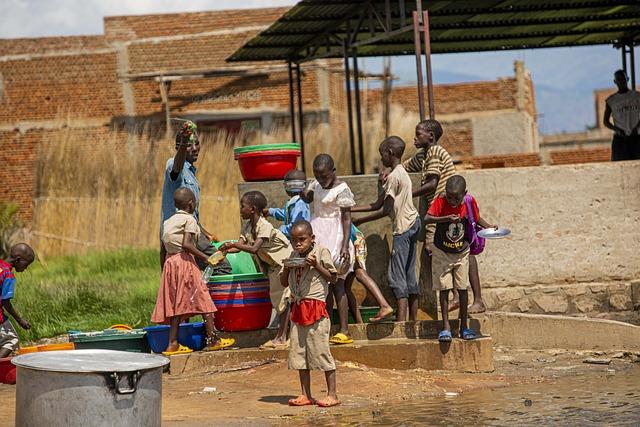Title: Burundi’s Children Hit Hard by Mpox – UNICEF
In a stark reminder of the ongoing health crises facing vulnerable populations, UNICEF has raised alarms about the devastating impact of mpox on children in Burundi. The recent resurgence of this infectious disease, onc known primarily for its effects on adults, has begun to disproportionately affect the nation’s youngest and most vulnerable citizens. As families grapple wiht the dual challenges of a waning healthcare infrastructure and socioeconomic instability,the plight of children amid this outbreak underscores a critical humanitarian concern. With rising infection rates and limited access to medical care, urgent measures are needed to safeguard the health and well-being of Burundi’s future generations. This article delves into the current situation, examining the factors contributing to this public health emergency and the response efforts being undertaken to protect the nation’s children from the ravages of mpox.
Impact of Mpox Outbreak on Burundian Youth

The mpox outbreak has created a significant ripple effect on the youth in Burundi, disrupting their daily lives and creating new layers of adversity. The disease not only poses immediate health risks but also exacerbates existing vulnerabilities, especially among children from low-income families. With schools facing closures and health facilities overwhelmed, educational opportunities have dwindled, leaving many young people without the essential skills they need for a brighter future. The consequences of this outbreak extend beyond health, leading to heightened levels of anxiety, isolation, and a sense of hopelessness.
Many young Burundians are grappling with the psychological toll of the outbreak. Reports indicate a rise in instances of mental health issues, with factors such as fear of infection and social stigma playing a critical role. The community’s response has been mixed, as misinformation about Mpox spreads, complicating efforts to promote awareness and safety measures. To address these challenges, stakeholders are emphasizing the need for enhanced support systems, including:
- Community education programs to inform families about Mpox prevention.
- Psychosocial support initiatives to help youth cope with the emotional impacts.
- Access to online learning resources to mitigate educational disruptions.
Considering the current crisis, a coordinated effort between government agencies, NGOs, and local organizations is crucial. The following table illustrates key areas where intervention is needed:
| Area of Intervention | Current Challenges | Proposed Solutions |
|---|---|---|
| Education | School closures | Online and community-based learning programs |
| Mental Health | Increased anxiety and stigma | Support groups and counseling services |
| Health Awareness | Misinformation about Mpox | Community health education initiatives |
Health challenges Faced by Affected Children

The outbreak of Mpox in Burundi has significantly impacted the health of affected children, leading to a range of serious health challenges. These children often experience severe skin lesions that can cause pain and discomfort, leading to decreased mobility and increased vulnerability to secondary infections.The disease can also trigger psychosocial issues, where children suffer from stigmatization and isolation from peers and communities, exacerbating their emotional distress. Access to healthcare is further complicated by existing socioeconomic barriers, limiting their ability to receive timely and adequate treatment.
Additionally,the nutritional status of these children is at risk,as many families affected by Mpox face economic hardships that limit their access to food resources. The pressing health challenges include:
- Increased risk of respiratory infections due to compromised skin integrity.
- Growth of scarring that can lead to long-term disfigurement and psychological trauma.
- Difficulty in accessing mental health services, exacerbating feelings of hopelessness and anxiety.
- potential disruption of educational opportunities, as children might potentially be unable to attend school during their recovery.
UNICEF’s Response and Support initiatives

In response to the devastating impact of Mpox on children in Burundi, UNICEF has mobilized resources and implemented several strategic initiatives to provide immediate and sustained assistance. Their response plan includes health interventions, ensuring that children affected by Mpox receive timely medical care and vaccinations to prevent further outbreaks. UNICEF has also prioritized the distribution of essential supplies, including:
- Personal protective equipment (PPE) for healthcare workers.
- Diagnostic tools to facilitate quick identification of cases.
- Medicines and treatment supplies for affected children.
Recognizing the critical role of education in recovery, UNICEF is also working to ensure access to education for children who have been displaced or affected by the outbreak. Programs aimed at creating safe learning environments are being rolled out, which include emotional and psychosocial support. UNICEF’s efforts encompass community engagement and awareness campaigns to educate families about Mpox, focusing on prevention and healthy practices. The association collaborates with local NGOs and government partners to maximize the effectiveness of these initiatives, creating a framework of support that is responsive to the evolving needs of the children in Burundi.
Community Awareness and Education Efforts

In response to the escalating Mpox outbreak affecting children in Burundi, community awareness and education initiatives have become pivotal. Local health authorities,in partnership with UNICEF,are mobilizing resources to disseminate vital details. These campaigns are focused on providing accurate knowledge about Mpox transmission, prevention methods, and the importance of seeking timely medical care. Efforts include:
- Workshops and seminars for parents and guardians to educate them about the signs and symptoms of Mpox.
- Distribution of educational materials, such as flyers and posters, in schools and community centers.
- Collaboration with local leaders to ensure culturally sensitive messaging reaches diverse populations.
- Peer education programs that empower older children to share information with younger peers.
The impact of these efforts is being closely monitored through community feedback sessions and health surveys.A recent table highlights the reach of various educational programs across different regions:
| Region | Workshops Conducted | Materials Distributed | Community Reached |
|---|---|---|---|
| Bujumbura | 15 | 2,000 | 5,000 |
| Gitega | 10 | 1,500 | 3,200 |
| Bururi | 8 | 1,000 | 2,500 |
| Muramvya | 12 | 1,800 | 4,000 |
Through these complete educational initiatives,the aim is to empower the community with knowledge that not only combats the spread of Mpox but also fosters a culture of health and well-being for children and families in Burundi.
Long-term Solutions for Child Health in Burundi

The recent outbreak of Mpox in Burundi has underscored the urgent need for lasting child health initiatives.To combat the immediate and long-term effects of such health crises, a multifaceted approach is essential. Key areas of focus should include:
- Enhancing Vaccination Programs: Implementing widespread vaccination efforts to protect children from Mpox and other preventable diseases.
- Community Health Education: Raising awareness about hygiene practices and disease prevention through workshops and local outreach programs.
- Improving Healthcare Infrastructure: Investing in healthcare facilities to ensure they are adequately equipped to handle outbreaks and provide ongoing care.
- Strengthening Nutrition Programs: Establishing robust nutrition initiatives to address malnutrition, which is crucial for children’s resilience in facing illnesses.
Additionally, collaboration with local and international organizations is vital for implementing triumphant strategies. This includes:
| Collaboration Areas | Potential Partners |
|---|---|
| Healthcare Training Initiatives | WHO, local medical universities |
| Community outreach Programs | ngos, local leaders |
| Nutritional Support Initiatives | UNICEF, food banks |
By prioritizing these long-term strategies, Burundi can create a resilient healthcare framework that not only addresses the current crises but also prepares for future challenges, ensuring a healthier future for its children.
key Takeaways
the devastating impact of mpox on children in Burundi highlights the urgent need for comprehensive public health initiatives and targeted interventions. As UNICEF works tirelessly to provide support and resources for the affected communities, it is crucial for national and international stakeholders to collaborate in addressing the underlying vulnerabilities that exacerbate the crisis. Ensuring access to healthcare, raising awareness about prevention, and fostering resilience among families are vital steps towards safeguarding the futures of these children. The plight of Burundi’s youngest must remain a priority on the global agenda, reminding us that the health of future generations hinges on our collective response to such pressing health challenges. Only through sustained effort, compassion, and solidarity can we hope to alleviate the burdens borne by the children of Burundi and pave the way for a healthier tomorrow.







